Submissions are invited for the 2024 Book Award
2024 Award Eligibility and Requirements
Details regarding eligibility and requirements for the 2024 Book Award are provided below. For books to be considered, the awards committee must receive a completed nomination form as well as one copy of the nominated book at each of the committee members’ addresses by 1 April 2024.
The winner(s) of the award obtain a (joint) prize of $1000 USD. ACUNS members and nonmembers alike are encouraged to nominate outstanding works. The award winners are announced in advance of the ACUNS Annual Meeting and recognized during the conference.
Due to the large number of applications received, ACUNS cannot provide information regarding the evaluation of any individual application or return submitted materials. For questions, please contact the ACUNS Administrative Coordinator at admin@acuns.org.
The award will go to the author(s) or editor(s) of the best book that focuses on some aspect of the United Nations and/or the United Nations System. Books unrelated to the UN or UN System will not be considered. The competition is limited to books, not other types of publications. Books published in the last 3 years, from 1 January 2021, are eligible. Authors/editors need not be members of ACUNS. You may nominate your own publication or that of someone else. The winner of the award will be announced early June, and the award will be formally bestowed during the ACUNS Annual Meeting 2024 in Tokyo.
To nominate a book, you must complete the short form on this page and mail one copy of the book to each of the three addresses indicated below. You can nominate your own work or that of another author/editor. The three awards committee members must receive copies of the nominated book by 1 April 2024.
Send a copy of your book to each Committee Member:
Name: Dahlia Simangan
Email: simangan@hiroshima-u.ac.jp
Mailing Address:
The IDEC Building, Hiroshima University
1-5-1 Kagamiyama, Higashi-Hiroshima, Hiroshima, Japan 739-8529
Name: Yvan Yenda Ilunga
Email: yvan.ilunga@salve.edu
Mailing Address:
Dr. Yvan Yenda Ilunga
Department of Political Science and International Relations
Salve Regina University
100 Ochre Point Ave., Newport, RI 02840
Name: Hannah Birkenkoetter
Email: hannah.birkenkotter@itam.mx
Mailing address:
Calle Texas 71, int. 602
Colonia Nápoles, Benito Juárez
03810 Ciudad de México (CDMX)
Mexico
Brief History of the Book Award
From 2008 to 2020, the independent endowment fund “Friends of ACUNS” bestowed a biennial Book Award to the author(s) or editor(s) of the best recently published book focusing on some aspect of the United Nations and/or the United Nations System. In 2020, “Friends of ACUNS” re-incorporated into ACUNS, which continues to bestow the biennial Book Award. Past award winners are recognized below on this webpage.
Past Award Winners
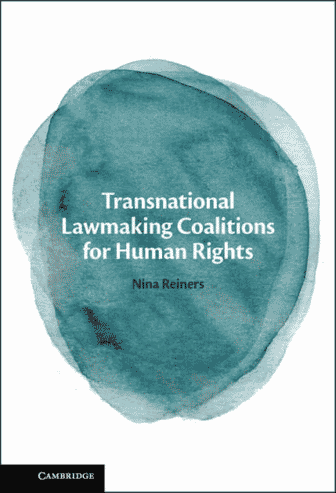
2022: Transnational Lawmaking Coalitions for Human Rights
By: Nina Reiners
Published by: Cambridge University Press
Summary
Transnational Lawmaking Coalitions is the first comprehensive analysis of the role and impact of informal collaborations in the UN human rights treaty bodies. Issues as central to international human rights as the right to water, abortion, torture, and hate speech are often only clarified through the instrument of treaty interpretations. This book dives beneath the surface of the formal access, procedures, and actors of the UN treaty body system to reveal how the experts and external collaborators play a key role in the development of human rights. Nina Reiners introduces the concept of ‘Transnational Lawmaking Coalitions’ within a novel theoretical framework and draws on a number of detailed case studies and original data. This study makes a significant contribution to the scholarship on human rights, transnational actors, and international organizations, and contributes to broader debates in international relations and international law.
About the Author
Nina Reiners is a Political Scientist in the interdisciplinary research group “International Rule of Law: Rise or Decline?” at Free University Berlin and research associate at the Global Governance Centre at the Graduate Institute Geneva. She earned her PhD in Political Science from the University of Potsdam.
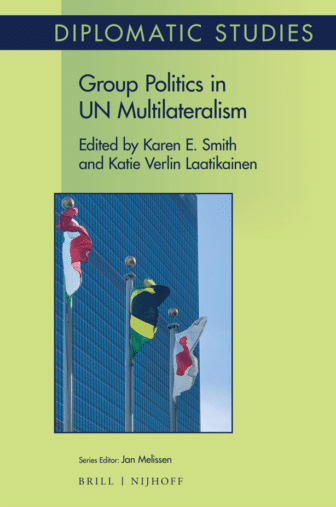
2020: Group Politics in UN Multilateralism
Edited by: Karen E. Smith and Katie Verlin Laatikainen
Published by: Brill Nijhoff
Summary
Group Politics in UN Multilateralism provides a new perspective on diplomacy and negotiations at the United Nations. Very few states ‘act individually’ at the UN; instead they often work within groups such as the Africa Group, the European Union or the Arab League. States use groups to put forward principled positions in an attempt to influence a wider audience and thus legitimize desired outcomes. Yet the volume also shows that groups are not static: new groups emerge in multilateral negotiations on issues such as climate, security and human rights. At any given moment, UN multilateralism is shaped by long-standing group dynamics as well as shifting, ad-hoc groupings. These intergroup dynamics are key to understanding diplomatic practice at the UN.
About the Editors
Karen E. Smith, PhD (1996), is Professor of International Relations at the London School of Economics and Political Science. She has published extensively on EU foreign relations, EU human rights policy, and EU-UN relations.
Katie Verlin Laatikainen, Ph.D. (1996), is Professor of Political Science at Adelphi University. Her publications include The Routledge Handbook on the European Union and International Institutions (2013) and The European Union and the United Nations: Intersecting Multilateralisms (2006).
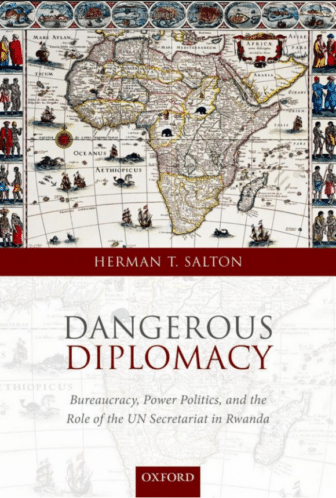
2018: Dangerous Diplomacy: Bureaucracy, Power Politics, and the Role of the UN Secretariat in Rwanda
By: Herman T. Salton
Published by: Oxford University Press
Summary
Dangerous Diplomacy reassesses the role of the UN Secretariat during the Rwandan genocide. With the help of new sources, including the personal diaries and private papers of the late Sir Marrack Goulding—an Under-Secretary-General from 1988 to 1997 and the second highest-ranking UN official during the genocide—the book situates the Rwanda operation within the context of bureaucratic and power-political friction existing at UN Headquarters in the early 1990s. The book shows how this confrontation led to a lack of coordination between key UN departments on issues as diverse as reconnaissance, intelligence, and crisis management. Yet Dangerous Diplomacy goes beyond these institutional pathologies and identifies the conceptual origins of the Rwanda failure in the gray area that separates peacebuilding and peacekeeping. The difficulty of separating these two UN functions explains why six decades after the birth of the UN, it has still not been possible to demarcate the precise roles of some key UN departments.
About the Author
Herman T. Salton is Associate Professor of Politics, Philosophy, and Economics at the Asian University for Women, a liberal arts college in Chittagong, Bangladesh, with a support foundation in Cambridge, Massachusetts that promotes gender equality and draws students from Asia and the Middle-East. He teaches and publishes in the areas of international politics, international law, human rights, and the United Nations.
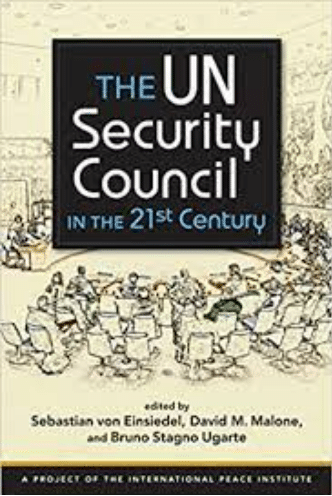
2016: The UN Security Council in the 21st Century
Edited by: Sebastian von Einsiedel, David M. Malone, and Bruno Stagno Ugarte
Published by: Lynne Rienner Publishers
Summary
After grappling for two decades with the realities of the post–Cold War era, the UN Security Council must now meet the challenges of a resurgence of great power rivalry. Reflecting this new environment, the UN Security Council in the 21st Century provides a comprehensive view of the council’s internal dynamics, its role and relevance in world politics, and its performance in addressing today’s major security challenges.
About the Editors
Sebastian von Einsiedel is Director of the UNU Center for Policy Research.
David M. Malone is Under-Secretary-General of the United Nations and also Rector of the United Nations University (UNU).
Bruno Stagno Ugarte, most recently executive director of the Security Council Report, now serves as Deputy Executive Director for Advocacy at Human Rights Watch.
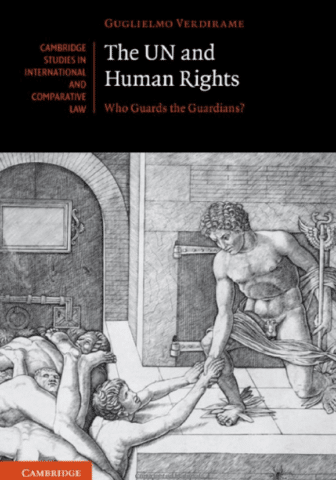
2014: The UN and Human Rights: Who Guards the Guardians?
By: Guglielmo Verdirame
Published by: Cambridge University Press
Summary
Through an analysis of UN operations, including international territorial administration, refugee camps, peacekeeping, the implementation of sanctions and the provision of humanitarian aid, this book shows that the powers exercised by the UN carry a serious risk of human rights abuse. The International Law Commission has codified and developed the law of institutional responsibility, but, while indispensable, these principles and rules cannot on their own ensure compliance and accountability. The ‘liberty deficit’ of the UN and of other international organisations thus remains an urgent legal and political problem. Some solutions may be available; indeed, recent state and institutional practice offers interesting examples in this respect. But at a fundamental level we need to ask ourselves whether, judged on the basis of the principle of liberty, the power shift from states to international organisations is always beneficial.
About the Author
Guglielmo Verdirame is a Professor of International Law and joined King’s College London in September 2011. Before coming to King’s, he was a Lecturer in the Faculty of Law at the University of Cambridge and a Fellow of the Lauterpacht Centre for International Law (2003-2011); a Junior Research Fellow at Merton College, Oxford (2000-2003); and a Research Officer at the Refugee Studies Centre at the University of Oxford (1997-98). He also held a visiting appointment at Harvard Law School (2007) and was Director of Studies for Public International Law at the Hague Academy of International Law (2006). Verdirame has also authored Rights in Exile (Berghahn Books, 2005), as well as numerous articles and chapters in books.
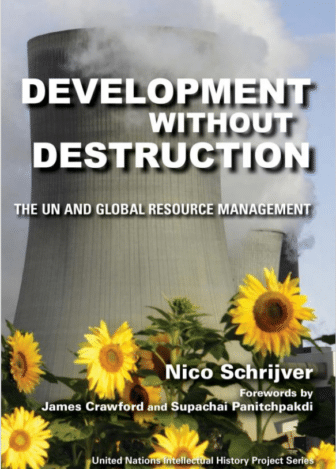
2012: Development Without Destruction: The UN and Global Resource Management
By: Nico Schrijver
Published by: Indiana University Press
Summary
Since 1945, the UN has been actively engaged in conceptualizing strategies for both economic development and a sustainable environment. From a broad historical perspective, Development without Destruction sketches the role played by organizations and individuals in the UN system in developing and consolidating principles of international law and international governance with respect to natural resource management. Nico Schrijver highlights the UN’s efforts to generate and implement strategies to resolve tensions between economic development and environmental protection, conservation and exploitation, sovereignty and internationalism, and armed conflict and peaceful access to natural resources. Schrijver’s thorough analysis is an indispensable guide to management of the critical environmental issues on today’s global agenda.
About the Author
Nico Schrijver holds the Chair of International Law and is Academic Director of the Grotius Centre for International Legal Studies at Leiden University. He is author of The Evolution of Sustainable Development in International Law: Inception, Meaning, and Status and Sovereignty over Natural Resources: Balancing Rights and Duties.
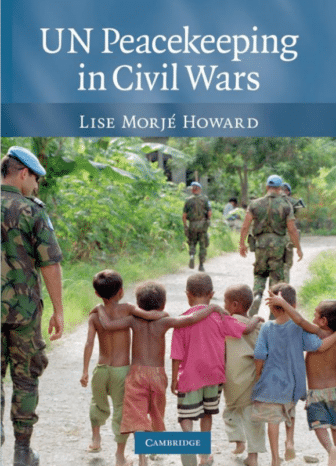
2010: UN Peacekeeping in Civil Wars
By: Lise Morjé Howard
Published by: Cambridge University Press
Summary
Civil wars pose some of the most difficult problems in the world today and the United Nations is the organization generally called upon to bring and sustain peace. Lise Morjé Howard studies the sources of success and failure in UN peacekeeping. Her in-depth analysis of some of the most complex UN peacekeeping missions debunks the conventional wisdom that they habitually fail, showing that the UN record actually includes a number of important, though understudied, success stories. Using systematic comparative analysis, Howard argues that UN peacekeeping succeeds when field missions establish significant autonomy from UN headquarters, allowing civilian and military staff to adjust to the post-civil war environment. In contrast, failure frequently results from operational directives originating in UN headquarters, often devised in relation to higher-level political disputes with little relevance to the civil war in question. Howard recommends future reforms be oriented toward devolving decision-making power to the field missions.
About the Author
Lise Morjé Howard is an Assistant Professor in the Department of Government at Georgetown University. She received her M.A. and Ph.D. in Political Science from the University of California at Berkeley and her A.B. in Soviet Studies from Barnard College of Columbia University. She was the founding Director of the Master of Arts Program in Conflict Resolution at Georgetown, and prior to beginning graduate school, served as Acting Director of UN Affairs for the New York City Commission for the United Nations. Dr. Howard’s research and teaching interests span the fields of international relations, conflict resolution, and comparative politics. Her work focuses on civil wars, peacekeeping, and international mediation.
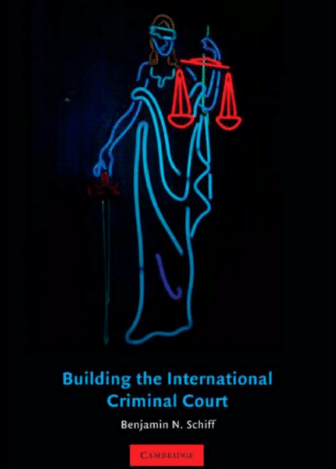
2009: Building the International Criminal Court
By: Benjamin N. Schiff
Published by: Cambridge University Press
Summary
Building the International Criminal Court analyzes the ICC, melding historical perspective, international relations theories, and observers’ insights to explain the Court’s origins, creation, innovations, dynamics, and operational challenges. The ICC is the first and only standing international court capable of prosecuting humanity’s worst crimes: genocide, war crimes, and crimes against humanity. It faces huge obstacles. It has no police force; it pursues investigations in areas of tremendous turmoil, conflict, and death; it is charged both with trying suspects and with aiding their victims; and it seeks to combine divergent legal traditions in an entirely new international legal mechanism. International law advocates sought to establish a standing international criminal court for more than 150 years. Other, temporary, single-purpose criminal tribunals, truth commissions, and special courts have come and gone, but the ICC is the only permanent inheritor of the Nuremberg legacy.
About the Author
Dr. Benjamin N. Schiff is a Professor of Politics at Oberlin College. He received his B.A. from Michigan State University and his Ph.D. from the University of California at Berkeley. He focuses on international politics and international organizations. He has published books on the International Atomic Energy Agency, on the U.N. Relief and Works Agency for Palestine Refugees, and on Afrikaners in South Africa at the end of apartheid.
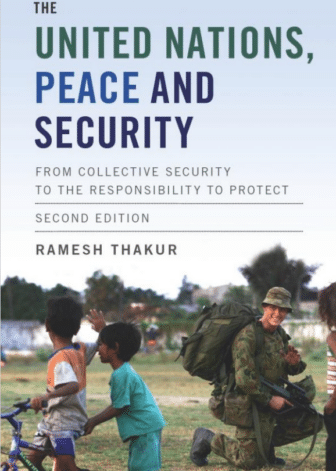
2008: The United Nations, Peace and Security: From Collective Security to the Responsibility to Protect
By: Ramesh Thakur
Published by: Cambridge University Press
Summary
The United Nations, Peace and Security examines the transformation in UN operations from dealing with interstate war to preventing humanitarian atrocities. It asks why, when and how force may be used, and argues that the growing gulf between legality and legitimacy is evidence of an eroded sense of international community.
About the Author
Lauded by the critics, Dr. Ramesh Thakur has established a formidable reputation as one of the world’s foremost commentators on the United Nations. His analysis is consistently informed by his extensive experience, both as an academic and a practitioner. Dr. Thakur is currently Professor of Political Science at the University of Waterloo and Distinguished Fellow at the Centre for International Governance Innovation, both in Waterloo, Ontario, Canada. He was Vice Rector and Senior Vice Rector of the United Nations University (and Assistant Secretary-General of the United Nations) from 1998-2007. He was a Commissioner and one of the principal authors of The Responsibility to Protect (2001), and Senior Adviser on Reforms and Principal Writer of the United Nations Secretary-General’s second reform report (2002).